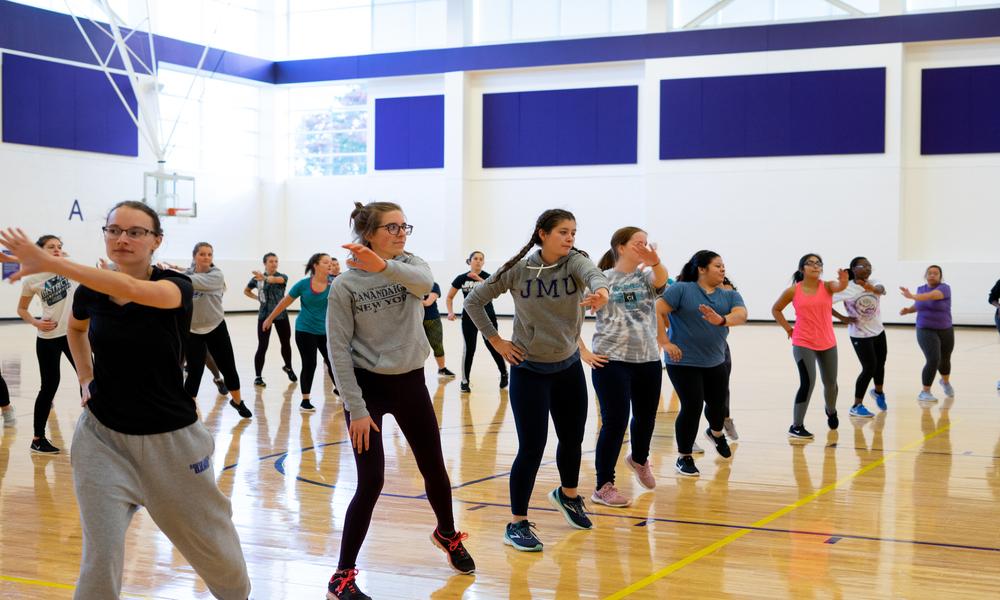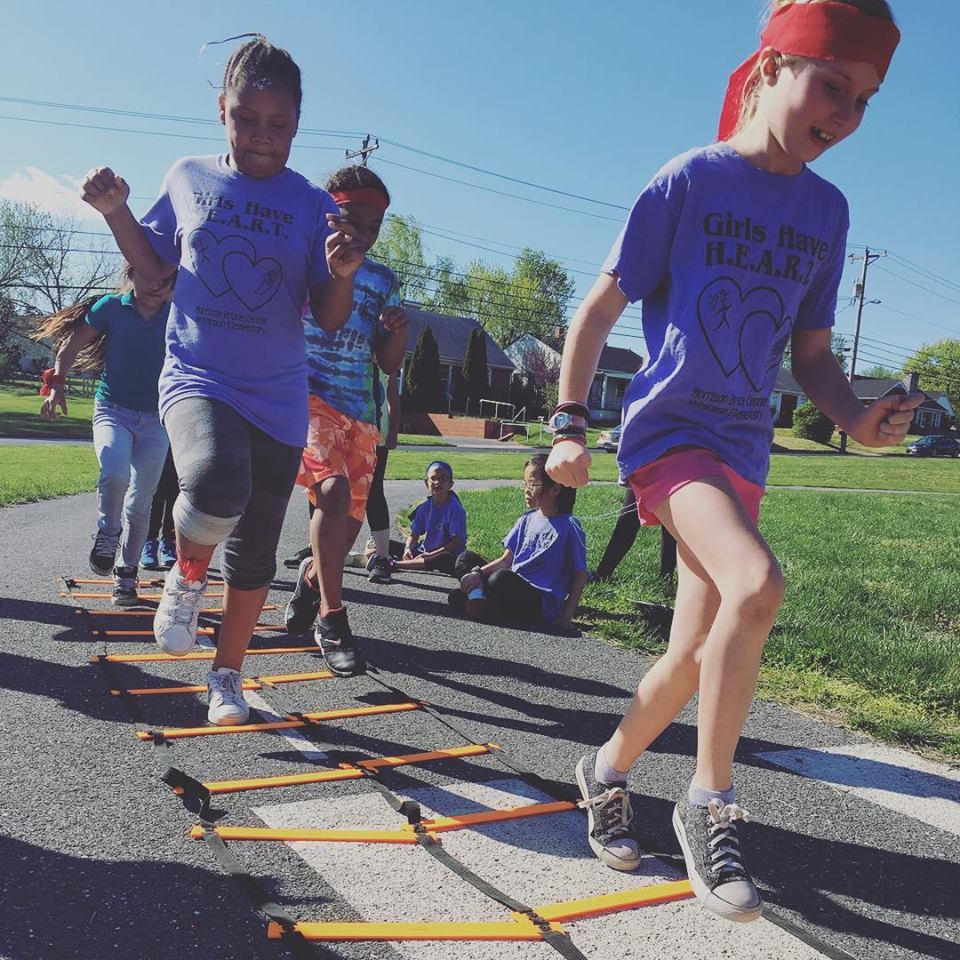JMU Center Engages Women and Girls in Wellness Activities
Research
By Zack Noftsinger (‘21) and Ben Delp (‘05), JMU Research & Scholarship
James Madison University’s Morrison Bruce Center (MBC) was founded in 2004 by Judith A. Flohr, a Professor Emerita of Kinesiology, for the purpose of expanding and enriching physical activity opportunities for women. The foundation for the MBC was laid over fifty years ago when Lee Morrison and Patricia Bruce accepted faculty positions at then, Madison College. Morrison specialized in history and principles of physical education, measurement and evaluation, and taught a graduate class on women in sport. Bruce taught swimming, sport psychology, motor learning, and sport sociology in the undergraduate and graduate programs. In 2006, the Morison Bruce Center was named in recognition of their efforts and leadership to promote physical activity.
The overarching mission of the Center is to honor the legacies of professors Morrison and Bruce, by dedication to enhancing the well-being of girls and women through the promotion of an active and healthy lifestyle. For the central Shenandoah Valley region, access to a center like Morrison Bruce is critical, as the Center seeks to combat and overcome the low participation rates, societal norms, and low level of opportunities for women to engage in wellness activities, which are amplified in rural areas. Morrison Bruce achieves its mission by engaging students and faculty in impact-driven scholarly pursuits and outreach programming. While not an exhaustive list, examples of programs offered by Morrison Bruce include:
-
Healthy Kids – A weekly program that teaches children, ages 3 to 4, basic nutrition concepts (e.g., fruits are good for our hearts, protein builds strong muscles, and healthy snacks keep us full) and provides developmental opportunities in fundamental motor skills (e.g., running, hopping, sliding, kicking) through age-appropriate, fun, and engaging activities.
-
Girls Have H.E.A.R.T. – A 10-week running program that aims to help 3rd through 5th grade girls develop healthy habits through non-competitive running and informative nutrition lessons. The main goal of Girls Have H.E.A.R.T. is to teach the importance of building a healthy lifestyle through fun and interactive activity and to enhance the self-esteem and self-worth of participants.
-
Barbells & Brunch – An event designed for JMU women (students, faculty, and staff) that provides opportunities to experience the University Recreation Center (UREC) weight room in a comfortable, educational, and open setting. The goal of Barbells & Brunch is to introduce the relevant knowledge and tools needed to develop confidence in utilizing the weight room and incorporating weight training into individualized training plans.
-
Older Women’s Wellness for Life (OWWL) – A two-day program that invites women ages 55 and older to JMU’s campus to engage in assessments of their overall health and wellness, and develop a personalized physical activity/exercise program. Participants attend lectures and workshops on topics related to nutrition, motivation, and the importance of physical activity for women's health.
For a full listing of programs and activities, visit the Morrison Bruce Center website.
With the help of a contingent of JMU students, women of all ages (participants have ranged from 3 to 90 years old) engage in the above mentioned fitness activities (and more) in non-competitive environments. In the past year, the MBC had two graduate students complete assistantships, Hannah Frick (‘19) and Shannon Dodsworth (‘20). They were joined by 11 undergraduate students pursuing for-credit learning experiences (for example, practicum, internship, and independent study) and an additional 13 students completing long-term volunteer experiences. Additionally, more than 150 students chose the MBC for short-term service-learning experiences.

Leading the Morrison Bruce Center are Elizabeth Edwards and Sarah Carson Sackett, faculty in the Department of Kinesiology. By utilizing partnerships with departmental colleagues and teams of student assistants, Edwards and Carson Sackett have conducted extensive research on fitness and wellness. Collaborations with other programs and departments at JMU have included dietetics and psychology, as well as UREC.
A recent scholarly investigation – “Relationships among Motor Skill, Perceived Self-Competence, Fitness, and Physical Activity in Young Adults” – was accepted for publication by Human Movement Science. From the abstract: “This large-scale, exploratory study sought to examine the associations between motor skill proficiency (MSP), perceived self-competence (PC), physical fitness (PF), and self-reported physical activity (PA) to assess the assumption that relationships among these variables found in childhood and adolescence persist into young-adulthood.” Participants were assessed using measures from the TGMD-2 and BOT-2 and evaluated using FitnessGram, in addition to completing surveys and reporting demographic, height, and weight information. Edwards and Carson Sackett’s study revealed “compelling evidence to believe relationships found among MSP, PC, PF, and PA in childhood and adolescence also exist in early adulthood.”
Another research example that is currently under review by Public Health Records is “Participation in a weekly book club improves health outcomes over 12-weeks in rural women: A Pilot Study.” Joined by colleagues from Arizona State University, the research team sought “to determine if a book club (i.e., Fit Minded) could improve physical activity participation, health outcomes, and related psychosocial aspects in adult rural women.” Upon participant completion of a 12-week book club focused on physical activity, self-worth, and health, as well as baseline and follow-up body measurements and a questionnaire, the results “demonstrate Fit Minded, with no face-to-face physical activity component, can improve psychosocial factors related to physical activity, which translate to improved markers of health in rural women.”
The MBC’s partnerships and extensive body of field work has positioned the Center as a premier location for students to gain valuable professional experience and complete volunteer projects. When asked to comment about the experience of engaging students, women, and girls through the Morrison Bruce Center, Edwards said, “For me, the most rewarding parts of working in the MBC is two-fold – Seeing the direct impact that we have on our participants, who start to see themselves as capable of living healthy and active lifestyles. But equally rewarding is helping our students develop the passion and skills necessary to make meaningful impacts on the world as they move on to a variety of professional goals.”
